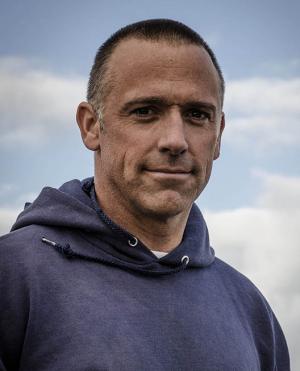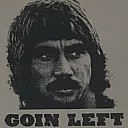Jock Serong: New media, old medium

"The point about ocean-addiction is that it starts and ends with the water. The ocean itself is the thing that issued the siren's call, not the material add-ons and assets that surround it. You misheard the call if you thought mere baubles would sate you."
The above passage is taken from the introduction to the new Australian magazine, Great Ocean Quarterly, and it sets the tone for what follows. Moving into a crowded marketplace, Great Ocean Quarterly distinguishes itself by its take on the ocean lifestyle. It speaks to those with a deep-seated devotion to the coast.
Jock Serong is the editor of Great Ocean Quarterly and he recently spoke to Swellnet about the project. At first Jock thought this would be an interview for broadcast. When I told him it was for the internet he dropped his John Laws voice and we got down to business:
Swellnet: Didn't you get the memo, Jock? Print is dead.
Jock Serong: (laughs) The premise here, we think, is that online is terrific and it's got its audience and it's got its place, but there will never, ever be a complete void where quality print is concerned. It's a matter of making good journalism but also making a beautiful physical object. Provided we can do that we think people are still going to buy print enthusiastically.
What's the genesis of Great Ocean Quarterly? Where did they idea come about?
It starts with Mick Sowry. Mick has spent a lifetime as an advertising creative and as a filmmaker, and it's something that he had been chipping away at for years. He'd talk to writers about it, he'd talked to photographers about it, and just this year it started to really gain momentum. He brought in his friend Mark Willett who has a history in marketing. The two of them are also surfers, they had that in common to start with, and Mark really started to give it some momentum. Then the two of them approached me to edit. That first meeting was in about January. Really we've been flat out since then building the various structures behind it to get the first issue out.
 After reading the first issue – the launch issue – it feels like the project is fully formed. I open it up and there's a double page spread for Audi. It's a good sign having such big hitters supporting you.
After reading the first issue – the launch issue – it feels like the project is fully formed. I open it up and there's a double page spread for Audi. It's a good sign having such big hitters supporting you.
Yeah, it is, but it has been very hard work securing those sort of names and it's not an ambition that is realised or complete. It's still up to us to deliver the goods for those advertisers and particularly deliver the goods for the readers.
You're not a straight surf magazine, though there is some surfing content. Other surf magazines have fallen over because of a lack of industry support, yet it appears you haven't gone after their support at all – is that correct?
That is correct. We don't see ourselves as competing with the surf magazines. The audience who we're trying to talk to are the people who feel a strong connection to the ocean. Some of them obviously are going to be surfers, but more widely they could be people who fall under all sorts of groupings like sailors, divers, naturalists, conservationists, oceanographers, the categories are limitless. So although I want to include surfers - we think surfing is a really important part of what we're talking about and who were talking to - but equally there's much more to it than that. I think the advertising reflects that.
So the question begs: what shelf will Great Ocean Quarterly sit on in the newsagent?
(laughs) Well that's an interesting debate. We've obviously been watching the newsagents with real interest. There's been a few that have plonked us smack in the middle of the surfing magazines, there's been a few that have taken it over the to the National Geographic and Australian Geographic, which were pretty happy with, then there's been a couple that have taken an each way bet and lobbed it in amongst the politics. The fact that they're putting it in a variety of positions indicates to us that we've found a really unique niche in the market.
Have you modelled Great Ocean Quarterly on any particular magazine or magazines?
I don't think we have. I think we've tried to listen to our instincts about what the things are that we enjoy, and then we've taken a calculated risk in saying that other people will enjoy them too. Having said that, I reckon there are little aspects of a whole range of publications if you look carefully.
For instance, the way we've done our advertising is a mix of majors, Audi and Coopers, and they'll take larger ads with real design values and real dramatic impact. And then there's little tiny local ads for coastal businesses which is a thing the New Yorker does. The stock and the format and the layout is reflective of mags like Frankie or Slow or Smith Journal. I think the content owes a little bit to the great geographic magazines like National Geo. And I think somewhere in there too is the soul of a surfing magazine. It's little bits and pieces of lots of things.
You've got a wide variety of contributors in the launch issue, will you have staff writers or will there be different contributors each issue?
What we're planning to do is trying to establish a few things as regular, in particular Mary-Jane Daffy up the back there with food and wine, and Arturo Bandini who will be writing about sports from his completely unique point of view. So there'll be departments in there. Beyond that, in order to launch we relied on friends and contacts, and we'll come back to those people from time to time but we'll also try and find first time writers and people overseas. I think it will be a fairly shifting task as we go along, Stu.
OK, now about you then Jock, you previously edited Australian Surf Business magazine and...
Ah...no I've been a contributor and sub-editor there, but that's edited by Keith Curtain.
My mistake. Have you finished up at ASB to take up the editor's role at Great Ocean Quarterly?
No, I'm juggling a range of things at the moment. I'm still writing for Keith at Australian Surf Business. I'm still writing for Surfing World. I'm doing a range of other freelancing work, for instance with Slow and few other travel magazines. I also write long fiction, I've got a novel in the works, plus a screenplay, and another novel...so yeah, I've got a lot on the go at the moment.
Yet you don't have a writing background, do you?
No, that's right, I was a lawyer for 17 years.
You must've been a frustrated lawyer.
(laughs) Well it's sort of a writing background.
But writing legalese is very different than writing fiction.
It's every bit as exacting, but it's exacting in the opposite direction in the sense that what you're trying to do when you write legally is suppress the human instinct and strive for great accuracy and objectivity. And when you write fiction you generally head in the other direction.
Will Great Ocean Quarterly have an online presence?
Yes, we'll always try to prioritise the print object itself, the physical artifact, but we'll also have content available online. For instance, one of the interesting projects we're doing is recording musicians in churches along the coast and then putting the recordings up on the website for people to download. The idea is that the articles in the magazine are so variable that if you find one that piques your interest you can dig quite deeply into it and then off the end of the printed article go online for more resources about that particular subject.
Excellent. Thanks for your time and all the best to Mick, Mark and yourself.
Visit the Great Ocean Quarterly website here.


Comments
After reading the above magazine I've got an observation to state, and although it doesn't wholly relate to the mag I'll post it here anyway.
The cultural differences between Victorians and New South Welshman is well-trodden territory, many people have tried to distinguish what it is that sets us apart. Sometimes they hit the mark, sometimes they totally miss.
One thing I do notice, and I was reminded of it while reading the above, is how Victorians mix sport and art. It's a generalisation no doubt, so don't come at me with specific examples, but over many years I've noticed a cohesion between the two that doesn't exist in NSW or anywhere else in Australia.
In NSW, sport and art form a dichotomy; each treated as the antithesis of the other. For instance, football and (good) music don't mix. Yet when I was younger and went to gigs in Melbourne it wouldn't be unusual to see punters wearing AFL colours in an unironic way. That simply wouldn't happen at the same gigs in Sydney; football represented something repugnant, at odds with Sydney music culture. In Melbourne it seemed acceptable.
There's a story in Great Ocean Quarterly that namedrops Captain Beefheart, Black Flag, and Husker Du, and the backdrop of the story is a local AFL game. The author deftly mixes sport and art. Similarly, there are stories on the Eastern Australian Salmon which "spawns during cricket season", and the Short-tailed Shearwater which "arrives home from migration around Grand Final weekend."
Mixing sport and art, something the Victorians do quite well.
It looks like a nice read but boy they're going to have to work hard and have some luck to make it work. Though I imagine they already know that.
BTW its a nice theory Stu but don't go taking up sociology.
Jock Serong
surely that's a make up name ?
Your theory has some merit Stu. The Painters and Dockers, and Hunters and Collectors, both from Melbourne, would often feature guys wearing VFL/AFL singlets on stage. Paul Kelly also glorified football in many of his songs. He also sung about Don Bradman.
At the same time, Sydney band Midnight Oil sang "Dad's so bad he lives in the pub/ it's underarms and football clubs/ Flat chat, Pine Gap, in every home a Big Mac," making clear what place football held in Sydney.
The bands betray my age, so whether the theory is still true I'm not sure.
Have always loved Jock's style of writing. Always remember a piece he did on the desert and the way he described and painted a picture with his words was spot on.
The intro to Great Ocean Quarterly is something else, and also the words from the PC photographer and story of Storming The Rip are excellent!